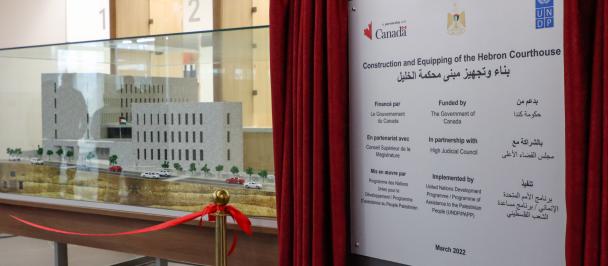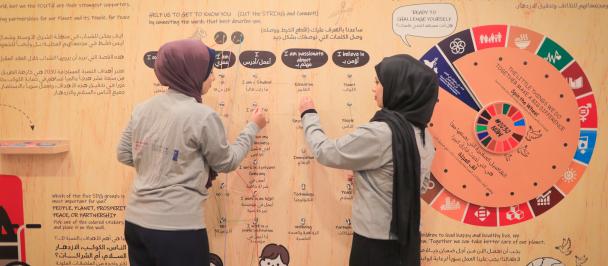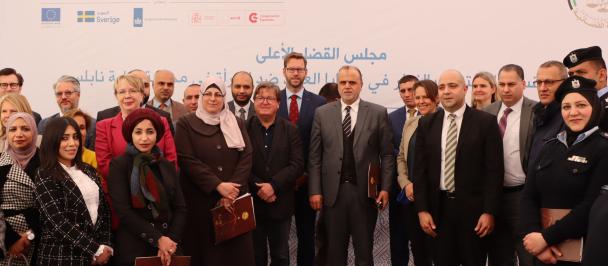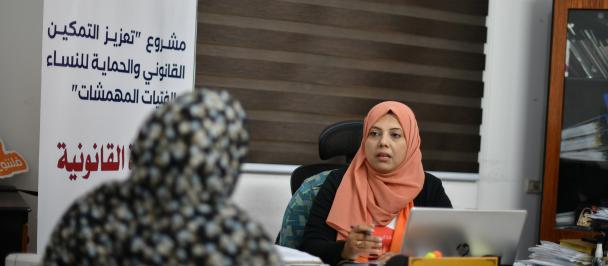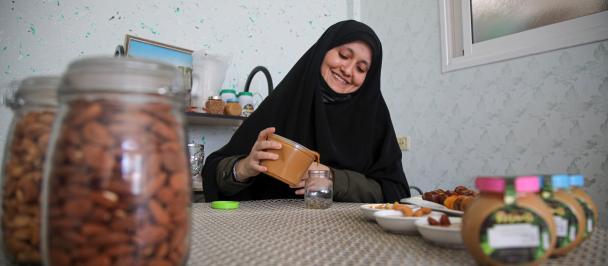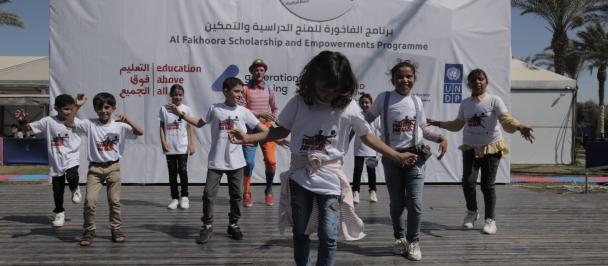Arwa at home with her 4 of her 5 sons; Ali, Mohammed, Abdullah, and Essa
“My story began 20 years ago, when I was wed to my husband then at the age of 14. It was even before the issuance of my identity card. Married life was not easy. It took me years to understand how a successful marriage should be, and then it ended – five years after his sudden departure,” Arwa explains.
Arwa is a 35-year old woman living in the Gaza Strip. A mother of five boys, aged between nine and 20, Arwa was granted her right of divorce by the Family court with the help of a legal aid clinic supported by the UNDP, UN Women, and UNICEF Sawasya joint programme - Promoting the Rule of Law in Palestine.
With 55 percent of youth being unemployed and living in densely populated rural areas, just like Arwa and her family, it becomes harder for women to pursue an education and economic opportunities. The practice of early marriage is widespread.
Arwa is a 35 year old woman from Gaza who benefited from legal aid under the Sawasya joint programme with UNDP, UNWomen and UNICEF
“My ex-husband was a member of my extended family. I was married at 14 to a man that I have never met. My marriage journey started with a total shock. We were not easily getting along and I was subjected to regular physical and verbal abuse. Every time I leave the house to my family’s, they would take me back to my husband. They feared the thought of divorce and the stigma that follows within our community. This was how I spent 15 years of my life”.
During the 2014 hostilities, Rafah border with Egypt was open for Palestinians living in the Gaza Strip without restrictions. Unlike now, people did not have to register to be allowed to cross. Arwa’s husband suddenly left Gaza to a foreign country without planning it previously with her and the family. He left behind him five children and a desperate mother with no resources or prospects. “He called me afterwards saying: I will not divorce you and will not help you come to where I live; deal with it in Gaza!”, Arwa added.
“I was born in a family that did not have a stable income. My mother was not educated, and my father was a worker with no education as well. I believe my situation today would have been different if my family’s economic state was better. Our current living conditions today are harsh. I cannot provide my sons with their basic needs. They request small and ordinary things; I cannot afford them. They requested new jackets for the winter season, but they had to wear old and small ones”.
Arwa, from Gaza, seeking advice at the legal aid clinic supported by the Sawasya joint programme
Arwa, from Gaza, seeking advice at the legal aid clinic supported by the Sawasya joint programme
Women seeking advice at the legal aid clinic in Gaza
Arwa was looking for financial support to be able to continue living with her children. She went to the Ministry of Social Development and requested to be added to their national aid programme. To determine her eligibility, she had either to demonstrate her family’s financial situation, her husband’s income and the amount he sends her (which he does not and she has no proof of that), or a divorce certificate to be included in the request.
Arwa went to the court requesting her divorce paper, hoping that her ex-husband might have had a change of heart and left them for her. She thought it was an easy undertaking but a long and costly process was awaiting her.
“One of the court employees advised me to go to the legal aid clinic. He said I can get free and excellent legal service there, and so I did. As I went in, I saw many people seeking justice just like me. I was not alone. I met one of the lawyers who patiently explained the procedure and helped process the case,” Arwa added.
“I welcomed Arwa at our clinic. We went through the legal steps. She filed her claim and now she has her divorce papers. This will help her live a dignified life with her sons. We receive hundreds of women at the legal clinic, just like Arwa. Our job at the clinic is to help disadvantaged women and provide them with free legal aid services, including consultation and representation in front of the Family court,” said the lawyer.
Arwa hanging wet clothes at the back of the house
Poor and illiterate women are the most vulnerable when it comes to accessing the justice system. Sawasya, through a firmly established partnership with an integrated network of legal providers, was able to ensure that the farthest left behind can access the Family and ordinary court systems and have their rights safeguarded. This support has proved particularly critical in ensuring that women with limited financial means can claim their rights - particularly in cases of divorce, custody, maintenance and inheritance – and that children in conflict with the law access fair trial and alternative pathways to detention. In 2019 alone, more than 36,000 Palestinians, including over 27,000 women and children, were able to consult a legal aid lawyer or have their case represented in court, 65 percent of them living in the Gaza Strip. But, economic empowerment is just as critical to enable these women to face their financial hardships, stigmatization and start again, instead of falling back into the cycle of violence and injustice.
Essa coming home from school
Ali studying for his Tawjihi – final year school exam
Arwa’s non-identical twins; Abdullah and Essa
The door is what Ibrahim, Arwa’s youngest son, uses as a writing board to do his homework and draw as they cannot afford to buy a drawing board
“I am sad not only by the fact that my husband abandoned us, but also because I have no education to lean back on to support my family. My sons, just like any other children have needs. They want to be like their friends. I regret I did not continue my education. I am willing to learn and work in any job to earn a living”.
Arwa received her divorce papers and was determined to start a new chapter in her life. Before her father died, he left her a piece of land to live on. With generous contributions, and loans, she was able to own a roof over her head. “My eldest son Ali offered to leave school and look for a job to support me and his brothers. I completely refused the idea. It is only with education that we can overcome this difficult situation. I vowed to help my five children pursue their education and do all I can to achieve it.”
Arwa still has a daily struggle to support her family. The five boys; Ali, Mohammed, Abdullah, Essa and Ibrahim acknowledge their mother’s relentless efforts and have committed themselves to education as a mean to a brighter and secure future and improved livelihood. Arwa continues to take care of her children and encourage them to pursue their dreams. She is also seeking other opportunities for herself. This has not proved to be an easy task. Arwa does not possess any formal education or training, and the humanitarian situation continues to deteriorate by the day in the Gaza Strip. In spite of this all, she refuses to lose hope. “I am ready to do whatever it takes to help them go through this experience. I am hopeful that the coming days will be brighter, as long as we are together”.
In the Gaza Strip, the Sawasya programme aims at improving vulnerable Palestinians access to justice, security and protection without discrimination, through the provision of legal aid services, particularly for women and children. Through the programme, over 113,000 vulnerable Palestinians (50 percent women, 09 percent children) have accessed legal aid so far across the State of Palestine. In the southern city of Rafah in the Gaza Strip, over 2,700 vulnerable Palestinians have accessed legal aid services over the past six years, among which 75 percent were women.
Since 2014, Sawasya represents the primary programmatic vehicle of the United Nations for advancing the rule of law, gender justice and human rights in the State of Palestine. As it entered its second phase in 2018, Sawasya brought together the main UN entities mandated and invested in these areas - United Nations Development programme (UNDP), United Nations Entity for Gender Equality and the Empowerment of Women (UN Women) and United Nations’ Children’s Fund (UNICEF) - in an integrated programme framework, that seeks to support the Palestinian government in building a progressively functioning and increasingly inclusive rule of law system that respects, protects and fulfils human rights and gender equality and promotes peace and security. The programme is funded by the Governments of the Netherlands, Sweden and Spain.

 Locations
Locations